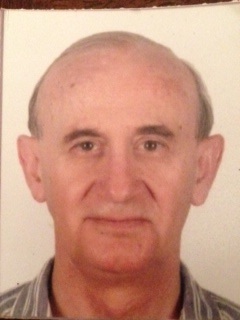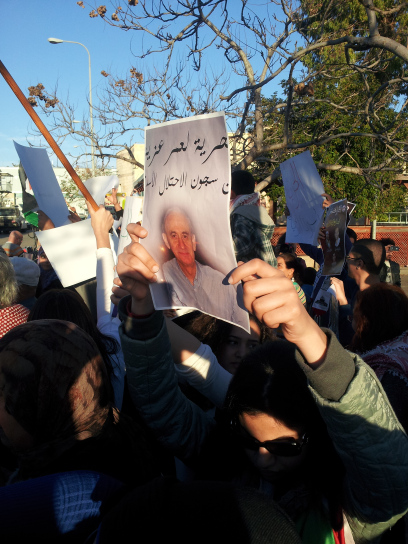 Mort en détention de Omar Aziz, père des comités locaux de la révolution syrienne
Mort en détention de Omar Aziz, père des comités locaux de la révolution syrienne
Omar Aziz, célèbre activiste pacifiste syrien de 64 ans, est mort en détention le 16 février 2013, a-t-on appris quelques jours plus tard par l’intermédiaire de sa famille.
Il est décédé à l’hôpital militaire de Harasta, dans la banlieue de Damas, des suites d’une longue captivité au centre de détention des services de renseignement de l’armée de l’air, à Mazzé, où il était détenu depuis son arrestation le 20 novembre 2012 dans une cellule de 16 mètres carrés avec 85 autres personnes.
Omar Aziz souffrait d’hypertension et avait perdu, selon ses proches, plus de 15 kilos. Peu avant sa mort, il a été transféré à la prison centrale d’Adra. Sa famille n’a jamais été informée de son état, ni même de son décès. Ce sont d’autres détenus qui lui ont fait parvenir la nouvelle.
Économiste de formation (à l’université de Grenoble) et versé dans les nouvelles technologies, Omar Aziz avait quitté l’Arabie saoudite, où il vivait, peu après le début de la révolution syrienne, en mars 2011. Il est l’un des architectes des comités locaux de coordination, qui ont grandement contribué à entretenir la révolte, lui donner des mots d’ordre et ont veillé le plus longtemps possible à ce que la lutte reste pacifique et non-confessionnelle.
“MIEUX QUE LA COMMUNE DE PARIS”
Il a fondé le premier comité local dans le quartier de Barzeh, une forme d’organisation « par le bas » qui a essaimé par la suite dans tout le pays. Il s’était inspiré des idées de Rosa Luxemburg sur « l’auto-gouvernement des masses ». Il avait formalisé sa vision humaniste et presque anarchiste dans un long article. « Nous avons fait mieux que la Commune de Paris, qui a résisté 70 jours. Cela fait un an et demi et nous tenons toujours », avait-il déclaré peu avant son arrestation.
Peu connu hors de Syrie, il avait gagné le surnom affectueux d’Abou Kamel. Malgré les destructions et les combats, il parcourait inlassablement les quartiers dévastés pour y amener de l’aide humanitaire aux familles déplacées et à celles comptant un mort, un blessé ou un disparu.
Il était issu d’une grande famille de la bourgeoisie intellectuelle damascène. Sa mère, Bourane Tarazi, a été la première femme avocate en Syrie. Elle avait écrit un livre, Damas dans la tourmente, publié en 1998 à Beyrouth, sur ses années de lutte pour l’émancipation sous le mandat français puis après l’indépendance.
Omar Aziz était le genre d’hommes dont la Syrie aura absolument besoin pour se reconstruire après le conflit en cours.
Publié par un parasite qui ne se gêne pas pour piller le travail des autres sans le sourcer (Christophe Ayad, Le Monde, 26 février 2013, voir ci-dessous)
Omar Aziz: Rest in Power
On 17 February 2013, the Local Coordination Committees of the Syrian revolution reported that Omar Aziz, prominent Syrian intellectual, economist, and long-time anarchist dissident, died of a heart attack in the central Adra prison. Held incommunicado by the air force intelligence since 20 November 2012, the big and warm – albeit ailing – heart of Omar Aziz could not stand almost three months of detention inside the infamous dungeons of the Assad regime. The reports of his passing emerged on the second anniversary of the Hariqa market protest, when 1,500 Syrians vowed for the first time not to be humiliated in the heart of Old Damascus. Aziz leaves behind a rich, significant legacy of ground-breaking intellectual, social and political contributions as well as an unfinished revolution and a country in desperate need for people like him.

“Freedom for Omar Aziz” in a demonstration for Palestinian prisoner Samer Issawi on Feb. 6th in Jerusalem
Omar Aziz did not wear a Vendetta mask, nor did he form black blocs. He was not obsessed with giving interviews to the press, nor did he make the headlines of mainstream media upon his arrest. He was not a son of the Facebook generation, but at the age of 63, his enthusiasm, ambition, and swashbuckling energy were matched by none of the twenty-somethings on the scene.
At a time when many activists were forced to flee, he chose to relinquish his safety in the United States and return to Syria to participate in the popular uprising that has swept through the country.
At a time when most anti-imperialists were wailing over the collapse of the Syrian state and the “hijacking” of a revolution they never supported in the first place, Aziz and his comrades were tirelessly striving for unconditional freedom from all forms of despotism and state hegemony.
While most secular and modernist intellectuals sat on the fence and even denounced protesters for marching from mosques, Aziz and his comrades created the first local council in Barzeh, Damascus. The local councils, an idea proposed and crystallised by Aziz at the end of 2011, are voluntary, horizontal associations inspired by the writings of Rosa Luxemburg. This idea was later adopted in most liberated areas in Syria.
While most leftist Arab and Western intellectuals robotically lecture the “masses” about Foucault, Marx and Sartre atop their ivory towers in a pretentious and complex language, Aziz and his comrades in Douma, Zabadani and Harasta gave life to the dead texts and tried to practice them on the ground amidst the crackdown.
…
Born into a bourgeois Damascene family in al-Amara neighbourhood on 18 February 1949, Omar Aziz majored in economics at Grenoble University in France. He went on to craft a successful career in information technology in Saudi Arabia and form a stable family life. Shortly after the eruption of the popular uprising in Syria, however, he returned to Damascus and joined the uprising as an intellectual, political and relief-work activist, adding the role of community organiser as well.

“Abu Kamel,” as his friends liked to call him, refused to remain confined to his home and books despite his troublesome health conditions. He wrote and worked on issues concerning free local self-governance and the transition to democracy. In addition, he constantly visited battle-torn areas in the Damascus countryside, distributed aid to displaced families, documented their needs, and made sure that aid distribution was managed properly. As Syrian filmmaker and ex-political prisoner Orwa Nyrabia put it: “Abu Kamel worked like a man in his twenties.”
In Assad’s Syria, where humanity and free thinking are treated like terrorism charges, it was expected that Omar Aziz would ultimately be arrested. He was kidnapped from his home in Western Mazzeh on 20 November 2012 at 4 p.m. Reports of his death circulated a day before his 64th birthday.
…
There is something tragically fitting about the way Omar Aziz bowed out of this world. For a man who always chose to work behind the scenes and who never vied for credit and personal glory, his death resembled his life. It was silent and far away from the glamour, but it came early – too early.
Omar Aziz avoided using the term “The people” and instead referred to people as “humans.” His comrade Mohammad Sami al-Kayal writes: “He did not believe in ‘The people,’ that jargon coined by authority to maintain its power. He saw human beings who live, thrive, and spout their potential.” He could envision the continuation and embodiment of Espinoza, the structures of Marx, and the craziness of Foucault in the fists of Douma’s residents, the dances of Barzeh’s youth, and the gun barrels of the fighters in Harasta. He once said: “We are no less than Paris Commune workers: they resisted for 70 days and we are still going on for a year and a half.”
Omar Aziz wrote about the importance of establishing non-hierarchal grassroots local councils that are independent from state control, and he did so long before there were liberated areas in Syria. When Aziz prepared the outline for the local councils, the uprising was still overwhelmingly peaceful, and most of the country was under the military control of the regime. At the time, he was mocked and ignored by the very people who would later adopt his idea and take credit for it.
Omar Aziz’s vision of the local council was founded on the premise that revolutions are exceptional events in which human beings live in two parallel time zones: the time of authority and the time of revolution. For the revolution to emerge victorious, it must break free from the domination of the authorities and become involved in every aspect of people’s lives, not just in demonstrations and political activism.
Aziz hoped that local councils would become an alternative for the state, but he knew that forming them in areas under tight security strongholds would be tougher. He also predicted that it would take time and effort to convince people that they can govern themselves and manage their affairs independently from the state and its bureaucracy. Aziz believed that the councils should work to provide people with a space for collective expression, where each individual can be politically involved in decision-making. For that to work, a network of solidarity and mutual aid among local councils in different areas must be formed. In addition, providing logistical, material and psychological support for displaced persons and prisoners’ families should be the responsibility of the local councils with the financial support of Syria’s political opposition in exile.
Omar Aziz’s paper about local councils constitutes the cornerstone for independent self-governance in most areas that achieved liberation from regime control.
…
Omar Aziz told his friends: “If the revolution fails, my life and that of my whole generation would be devoid of meaning… all that we have dreamt of and believed in would have been mere illusion.” He passed away before seeing the triumph of the revolution and reaping the fruits of his majestic work. Syrians who are still alive owe Omar Aziz and the tens of thousands of Syrian martyrs a massive debt. It is a debt that cannot be paid with tears and moving tributes. Nothing less than fighting like hell for a free Syria would suffice.
Hassan Budour, 20 février 2013 (sur le blog Random Shelling, dont la devise est : « We are sorry for the inconvenience, but this is a revolution »)

Ping : Retours sur la révolution syrienne » Sous La Cendre